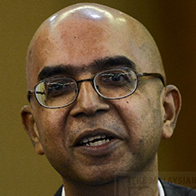The gist of my last article is that the government, the Cabinet, must do the will of the people, that they must do so through policies and legislation approved by the lower house, the Dewan Rakyat.
 That the Dewan Rakyat must scrutinise the Cabinet and raise the alarm if the Cabinet isn’t doing the right things right.
That the Dewan Rakyat must scrutinise the Cabinet and raise the alarm if the Cabinet isn’t doing the right things right.
That the upper house, the Dewan Negara (Senate), must review national decisions to assure they don’t unevenly impact on the regions which comprise our nation.
I outlined the different ways in which representatives are appointed to each house. I inferred the Dewan Negara is deformed, because the regime has stacked it with appointed members who consider the Dewan Negara a rubber stamp to approve the Cabinet’s will and has used it to introduce unelected ministers, and to park disgraced party members.
I called upon the two coalitions which will contend in the next general election to lay out in their manifestos on what they will do about the Dewan Negara.
Here, I’ll recount six ideas to reform the Dewan Negara, which have been proposed over the years.
The first idea is for Parliament to do away with the Dewan Negara and become unicameral like Singapore.
I do not favour this option because unlike Singapore, we have many areas with many differences.
Some have long coastlines. Some have land borders with neighbouring nations. Some have many forests. Some are dominated by manufacturing industries. Some have more enlightened interpretations of Islam. We need a Dewan Negara to look after the interests of these diverse areas.
A second idea is to restore balance in the sources of senators. We should have more representatives from state assemblies and fewer federal appointees.
We could correct the error made in 1963. In the spirit of the 20- and 18-point agreements which were the criteria by which Sabah and Sarawak agreed to form the federation, we could let the Sabah and Sarawak assemblies choose one third of the senators.
A third idea is to recognise that the Dewan Negara has failed to act as a watchdog because it has been infected by partisan politics, and respond by reserving senatorial seats for those at the top of their professions.
We could restrict membership to those who have led institutions like the Bar, Board of Engineers, trade unions or universities – or have been awarded the title of Tun (including Tun Dr Mahathir Mohamad and Tun Dr Ling Liong Sik!). The former could serve for limited periods, the latter could serve for life.
A fourth idea is to forbid appointment of non-elected senators to positions in the Cabinet.
This will result in parties being forced to favour “competent” persons over “winnable” persons when they nominate candidates for elections to the Dewan Rakyat.
This means we can be rid of people like Datuk Seri Ismail Sabri Yaakob (Umno-Bera), the minister behind Low Yat 2, a tech mall specifically for Malays and Datuk Raime Unggi (Umno-Tenom) who thinks Google Maps and Waze compromise national security.
A fifth idea is to have general elections for senators – our constitution already allows for this – and do away with appointed senators.
We could even adopt proportional representation: we could decide that the party with the most votes (not seats) in elections for the Dewan Rakyat gets to nominate senators. (Billy Bragg, a British singer songwriter, has been pushing a similar solution for the UK since 2001.)
A sixth idea is to do what is done in nations like India, where a third of the members of the upper house (Rajya Sabha) are replaced every year, and no member can serve for more than six years. (In Malaysia, senators are limited to two terms of three years each.)
Many more ideas have been suggested. None will work if both houses continue to be under the thumb of a member of the Cabinet.
It’s shocking but true: senators don’t even decide how many days they will sit in each year, it’s the minister “for Parliament” – now Datuk Seri Azalina Othman Said – who decides. Currently the Dewan Negara sits for only 25 days a year!
Is reform possible? The answer is a definite yes, for even that crusty old British institution, the House of Lords, has been reformed. I’ll write about it in my next article.
I’ll end by recalling challenge #3 in that noble document, Vision 2020: “fostering and developing a mature democratic society, practising a form of mature consensual, community-oriented Malaysian democracy that can be a model for many developing countries.”
In a mature democratic society, the Dewan Rakyat will hold the Cabinet accountable to the people, the Dewan Negara will hold the Dewan Rakyat accountable. What will the GE14 manifestos say about reforms of the Dewan Negara? – December 3, 2015.
* This is the personal opinion of the writer or publication and does not necessarily represent the views of The Malaysian Insider.


Comments
Please refrain from nicknames or comments of a racist, sexist, personal, vulgar or derogatory nature, or you may risk being blocked from commenting in our website. We encourage commenters to use their real names as their username. As comments are moderated, they may not appear immediately or even on the same day you posted them. We also reserve the right to delete off-topic comments